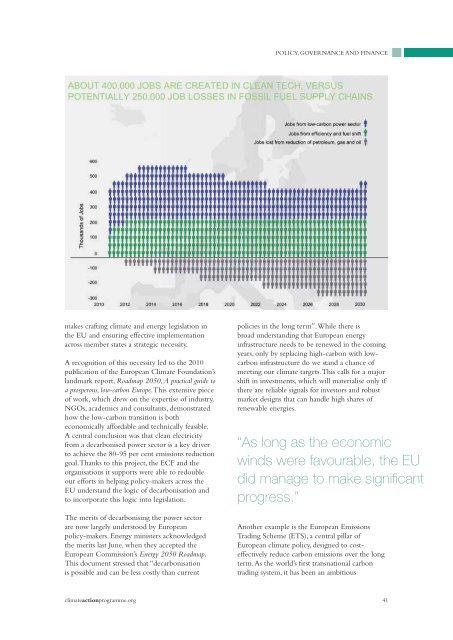Climate Action 2012-2013
You also want an ePaper? Increase the reach of your titles
YUMPU automatically turns print PDFs into web optimized ePapers that Google loves.
POLICY, GOVERNANCE AND FINANCE<br />
makes crafting climate and energy legislation in<br />
the EU and ensuring effective implementation<br />
across member states a strategic necessity.<br />
A recognition of this necessity led to the 2010<br />
publication of the European <strong>Climate</strong> Foundation’s<br />
landmark report, Roadmap 2050, A practical guide to<br />
a prosperous, low-carbon Europe. This extensive piece<br />
of work, which drew on the expertise of industry,<br />
NGOs, academics and consultants, demonstrated<br />
how the low-carbon transition is both<br />
economically affordable and technically feasible.<br />
A central conclusion was that clean electricity<br />
from a decarbonised power sector is a key driver<br />
to achieve the 80-95 per cent emissions reduction<br />
goal. Thanks to this project, the ECF and the<br />
organisations it supports were able to redouble<br />
our efforts in helping policy-makers across the<br />
EU understand the logic of decarbonisation and<br />
to incorporate this logic into legislation.<br />
The merits of decarbonising the power sector<br />
are now largely understood by European<br />
policy-makers. Energy ministers acknowledged<br />
the merits last June, when they accepted the<br />
European Commission’s Energy 2050 Roadmap.<br />
This document stressed that “decarbonisation<br />
is possible and can be less costly than current<br />
policies in the long term”. While there is<br />
broad understanding that European energy<br />
infrastructure needs to be renewed in the coming<br />
years, only by replacing high-carbon with lowcarbon<br />
infrastructure do we stand a chance of<br />
meeting our climate targets. This calls for a major<br />
shift in investments, which will materialise only if<br />
there are reliable signals for investors and robust<br />
market designs that can handle high shares of<br />
renewable energies.<br />
“As long as the economic<br />
winds were favourable, the EU<br />
did manage to make significant<br />
progress.”<br />
Another example is the European Emissions<br />
Trading Scheme (ETS), a central pillar of<br />
European climate policy, designed to costeffectively<br />
reduce carbon emissions over the long<br />
term. As the world’s first transnational carbon<br />
trading system, it has been an ambitious<br />
climateactionprogramme.org 41












